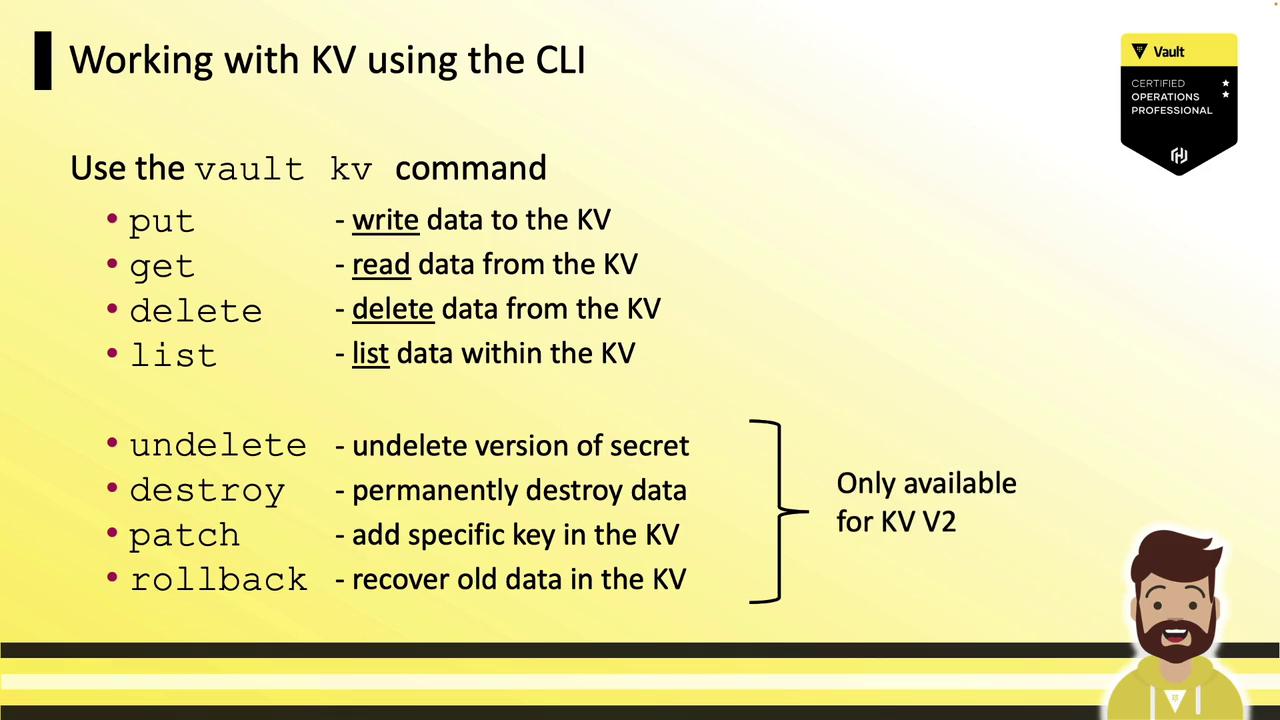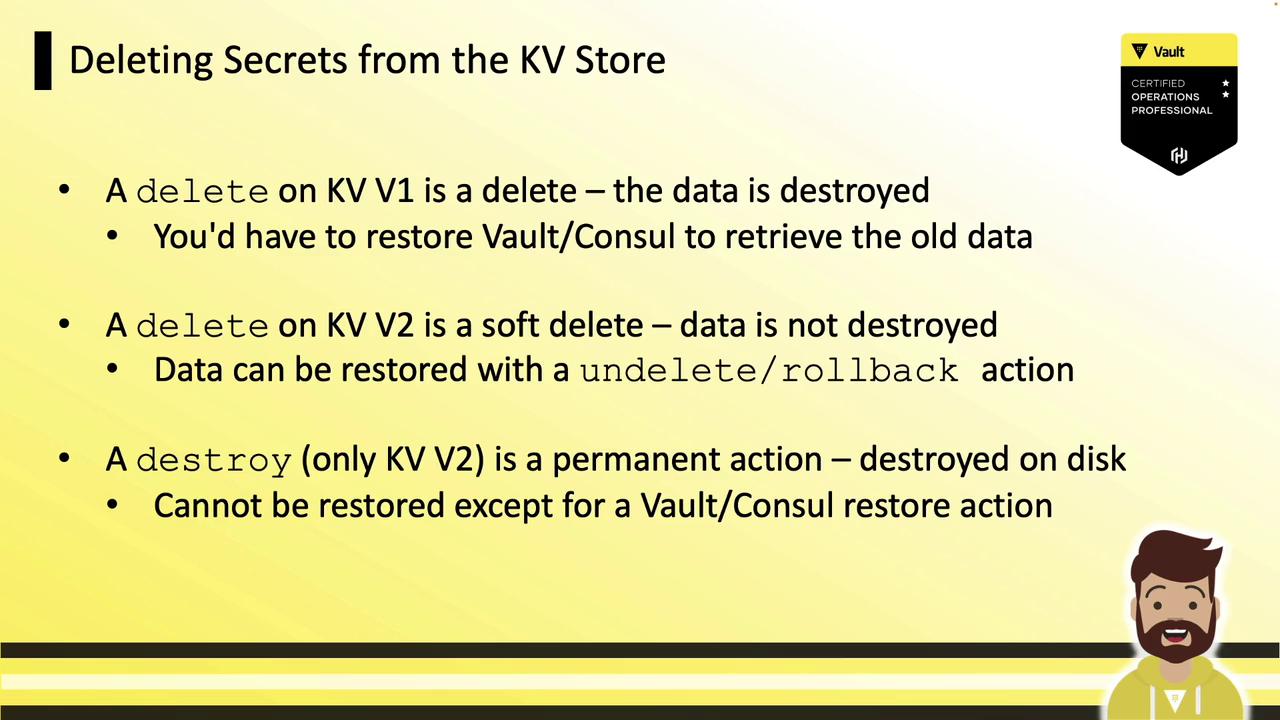HashiCorp Certified: Vault Operations Professional 2022
Create a working Vault server configuration given a scenario
Working with the KeyValue Secrets Engine
In this guide, you’ll learn how to manage secrets in HashiCorp Vault’s Key/Value (KV) Secrets Engine using the Vault CLI. We’ll cover writing, reading, deleting, and listing secrets in both KV v1 and v2, plus advanced v2-only operations: undelete, destroy, patch, and rollback.
Prerequisites
Ensure you have Vault CLI installed and authenticated. For installation instructions, see the Vault Installation Guide.
KV CLI Command Overview
Vault provides a unified vault kv command with these core subcommands:
| Subcommand | Description |
|---|---|
| put | Write data to a KV path |
| get | Read data from a KV path |
| delete | Delete data at a KV path |
| list | List keys under a KV path |
KV v2 adds these metadata and versioning operations:
| Subcommand | Description |
|---|---|
| undelete | Restore a soft-deleted version |
| destroy | Permanently delete one or more versions |
| patch | Update specific fields without overwriting |
| rollback | Restore an older version as the latest |

Comparing KV Version 1 vs. Version 2
Although vault kv put kv/app/db pass=123 uses the same syntax in both versions, the output and data paths differ:
KV Version 1
$ vault kv put kv/app/db pass=123
Success! Data written to: kv/app/db
KV Version 2
$ vault kv put kv/app/db pass=123
== Secret Path ==
kv/data/app/db
======= Metadata =======
Key Value
--- -----
created_time 2022-03-27T15:52:29.361762Z
custom_metadata <nil>
deletion_time n/a
destroyed false
version 1
Version 2 automatically prefixes your path with data/ and returns metadata, including version details.
Writing Secrets to the KV Store
Basic Write
$ vault kv put kv/app/db pass=123 user=admin api=a8ee4b50cce124
Success! Data written to: kv/app/db
Bulk Write from File
$ vault kv put kv/app/db @secrets.json
Success! Data written to: kv/app/db
Vault will read key/value pairs from secrets.json and store them at the specified path.
Data Replacement
Each put command replaces the entire data set at that path. It does not merge with existing keys.
Overwriting vs. Patching
To overwrite all data:
$ vault kv put kv/app/db api=39cms1204mfi2m
== Secret Path ==
kv/data/app/db
=== Data ===
Key Value
--- -----
api 39cms1204mfi2m
To update a single key without removing others:
$ vault kv patch kv/app/db user=bryan
======= Metadata =======
Key Value
--- -----
created_time 2022-12-22T17:57:35.157363Z
destroyed false
version 4
$ vault kv get kv/app/db
=== Data ===
Key Value
--- -----
pass 123
user bryan
api a8ee4b50cce124
Managing Versions: Rollback
Restore a previous version as the latest:
$ vault kv rollback -version=1 kv/app/db
== Secret Path ==
kv/data/app/db
======= Metadata =======
Key Value
--- -----
created_time 2022-12-21T14:49:23.746331Z
version 3
$ vault kv get kv/app/db
=== Data ===
Key Value
--- -----
pass 123
user admin
api a8ee4b50cce124
A new version (3) is created based on version 1, restoring the old data.
Reading Secrets
Retrieve the latest version:
$ vault kv get kv/app/db
== Secret Path ==
kv/data/app/db
======= Metadata =======
Key Value
--- -----
created_time 2022-12-15T04:35:56.395821Z
deletion_time n/a
destroyed false
version 1
=== Data ===
Key Value
--- -----
pass 123
user admin
api a8ee4b50cce124
JSON Output
For machine-friendly output, use -format=json or set VAULT_OUTPUT=json:
$ vault kv get -format=json kv/app/db
{
"data": {
"data": {
"pass": "123",
"user": "admin",
"api": "a8ee4b50cce124"
},
"metadata": {
"created_time": "2022-12-21T13:59:29.917893Z",
"custom_metadata": null,
"deletion_time": "",
"destroyed": false,
"version": 1
}
}
}
Working with Specific Versions
- Latest version:
$ vault kv get kv/app/db - Specific version (
N):$ vault kv get -version=N kv/app/db
Deleting and Destroying Secrets

KV Version 1
A delete permanently removes the data:
$ vault kv delete secret/app/database
Success! Data deleted (if it existed) at: secret/app/database
$ vault kv get secret/app/database
No value found at secret/app/database
KV Version 2
- delete performs a soft delete (marks data without purging).
- destroy permanently purges specified versions.
Soft Delete
$ vault kv delete secret/app/web
Success! Data deleted (if it existed) at: secret/app/web
$ vault kv get secret/app/web
== Secret Path ==
secret/data/app/web
======= Metadata =======
Key Value
--- -----
created_time 2022-12-15T17:41:41.130520Z
deletion_time 2022-12-15T17:42:03.369955Z
destroyed false
version 3
Destroy
$ vault kv destroy --versions=3 secret/app/web
Success! Purged version(s) from: secret/app/web
$ vault kv get secret/app/web
== Secret Path ==
secret/data/app/web
======== Metadata ========
Key Value
--- -----
created_time 2022-12-21T14:49:23.746331Z
destroyed true
version 3
Permanent Destruction
Once destroyed, the data cannot be recovered without a snapshot restore.
Summary
Vault’s KV Secrets Engine is your go-to store for arbitrary secrets. KV v2 enhances this with:
- Versioning and detailed metadata
- Soft deletes and permanent destroys
- Granular updates via
patch - Recovery operations:
undeleteandrollback
With these commands, you can confidently manage, version, and protect your secrets in Vault.
Links and References
Watch Video
Watch video content